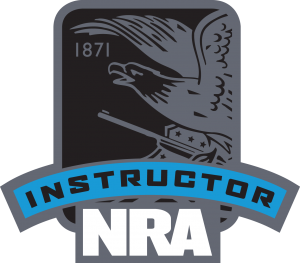
Our male and female instructors are certified by the state of Kansas to instruct concealed carry handgun permit courses. They are also certified through the NRA as Instructors and Range Safety Officers. We have an ever growing list of courses ranging from the very foundations to rather advanced training.
NRA Basics of Pistol Shooting Course:
This is a one day class, approximately 8 hours.
Students learn NRA’s rules for safe gun handling; pistol parts and operation; ammunition; shooting fundamentals; range rules; shooting from the bench rest position, and two handed standing positions; cleaning the pistol; and continued opportunities for skill development.
We will take the time to allow you to learn the proper way to get started with your handgun. This is a great class for new gun owners or for people who will be living in a household with handguns.
Students will receive the NRA Guide to the Basics of Pistol Shooting handbook, NRA Gun Safety Rules brochure, Winchester/NRA Marksmanship Qualification booklet, take a Basics of Pistol Shooting Student Examination, and course completion certificate.
Kansas Concealed Carry Handgun Licensing Course:
This is an 8 hour class following the Kansas Attorney General’s approved lesson plan. In additional to a very basic handgun course, each student must receive a block of instruction dealing with Kansas law and legal issues relating to firearms. The concealed carry class is not a tactical handgun course, but it does include instruction on ways to secure and conceal a handgun, safe methods of loading and unloading handguns and what to expect when a handgun is used in self-defense.
NRA Range Safety Officer Course:
Personal Protection Inside the Home Course:
Personal Protection In The Home (PPIH) takes you beyond the Basics of Pistol Shooting course to how you can protect yourself and your family in the real world from home invasions and life-threatening intrusions. It’s the second class in the NRA’s Personal Protection sequence for civilians.
This is an eight-hour course. Students should expect to shoot approximately 100 rounds of ammunition. Students will learn basic defensive shooting skills, strategies for home safety and responding to a violent confrontation, firearms and the law, how to choose a handgun for self-defense, and continued opportunities for skill development.
Students will receive the NRA Guide to the Basics of Personal Protection in the Home handbook, NRA Gun Safety Rules brochure, the Winchester/NRA Marksmanship Qualification booklet, and course completion certificate.
Personal Protection Outside the Home
Description: The course is divided into two levels. Level one is nine-hours and offers the essential knowledge and skills that must be mastered in order to carry, store, and use a firearm safely and effectively for personal protection outside the home. Students spend several hours on the range and shoot approximately 100 rounds of ammunition during level one. Upon completion, students may choose to attend level two, which is an additional five hours on the range and approximately 115 rounds of ammunition learning advanced shooting skills. Time and ammunition requirements are minimum, and may be exceeded. Students will receive the NRA Guide to the Basics of Personal Protection Outside The Home handbook, NRA Gun Safety Rules brochure and appropriate (level one/level two) course completion certificates(s)
Prerequisite: This course is for adult individuals who are not disqualified from possessing a firearm as defined by applicable federal, state, or local law and are of good repute and possess defensive pistol skills presented in the NRA Basics of Personal Protection In The Home Course. Participants must also understand the basic legal concepts relating to the use of firearms in self-defense, and must know and observe not only general gun safety rules, but also those safety principles that are specific to defensive situations. Prospective participants can demonstrate that they have the requisite knowledge, skills, and attitudes by producing an NRA Basic Personal Protection In The Home Course Certificate, or by passing the pre-course evaluation.
Defensive Pistol
The NRA Defensive Pistol Course is conducted by a select group of NRA Advanced Pistol Instructors. The training is objective based and will focus on the development of a defensive mindset. The goal of the course will be to develop the knowledge, skills, and attitude to carry and use a concealed pistol ethically, responsibly, and with confidence. The course is a follow-on course to the NRA Basic Pistol or FIRST Steps Pistol Shooting Course. Upon successful completion of this training, students should know and be able to demonstrate a number of defensive pistol techniques and shoot a timed qualification course of fire.
It is nothing like any of the other NRA pistol classes. For one thing, there will be no written quiz. This class is more of a mentoring class with lots of hands-on training, drills and lots of shooting. We will have a maximum of 10-12 students in the class as opposed to 16 – 20 in some of the other classes.
Prerequisite: This is NOT a Basic Pistol Class. Students must be experienced shooters able to show mastery of the basic skills of safe gun handling, shooting groups, zeroing the firearm, and cleaning the firearm. Proof of shooting experience must be met and approved by the instructor. Experience proof can be one of the following… NRA Basic / First Steps Pistol Class Certificate, NRA competitive pistol qualification card, Military DD214 w/pistol qualification, LEO Pistol certification, or passing the precourse assessment(see instructor). There is some classroom lesson time but the majority will be spent on the range with live-fire exercises.
